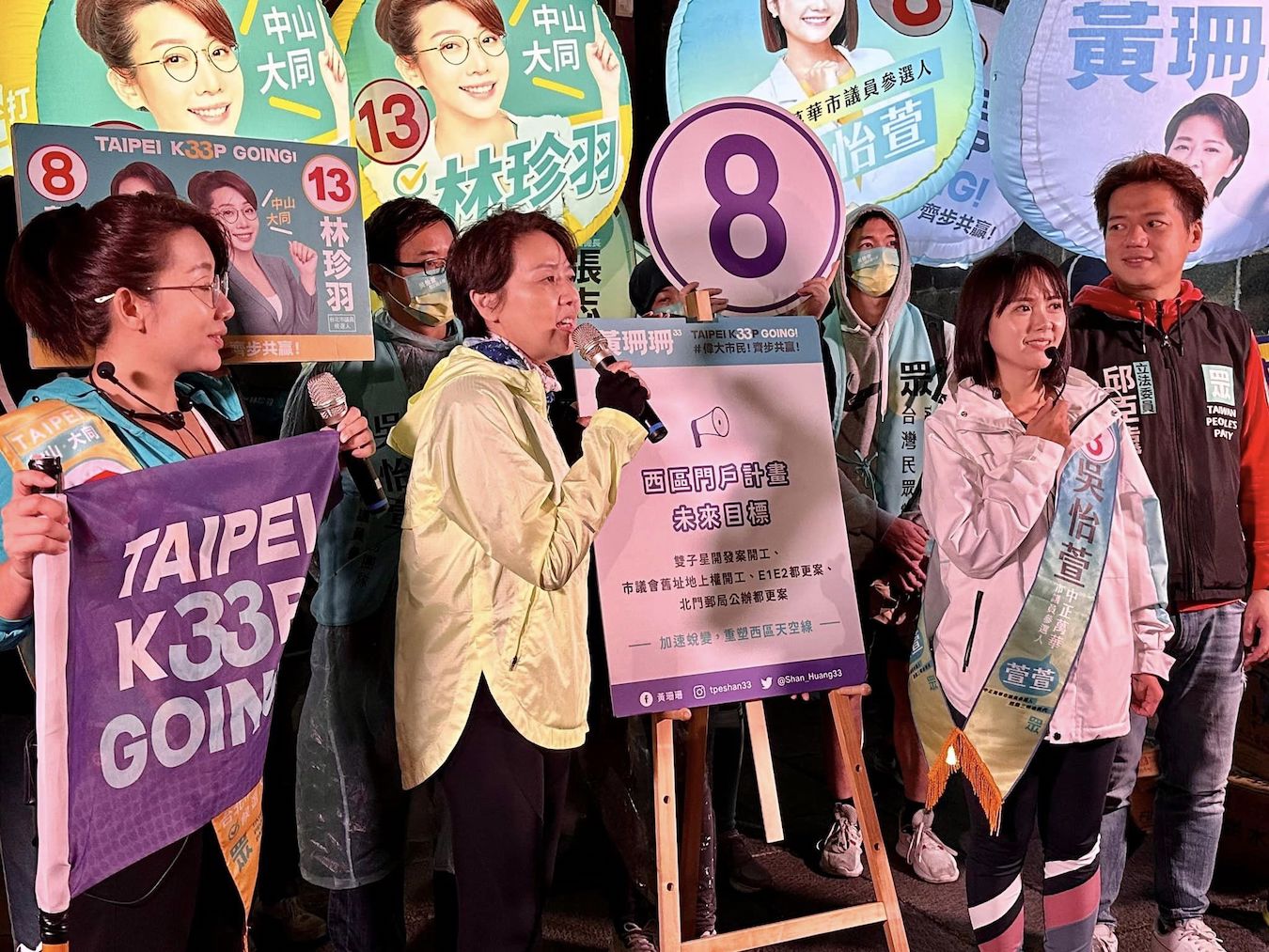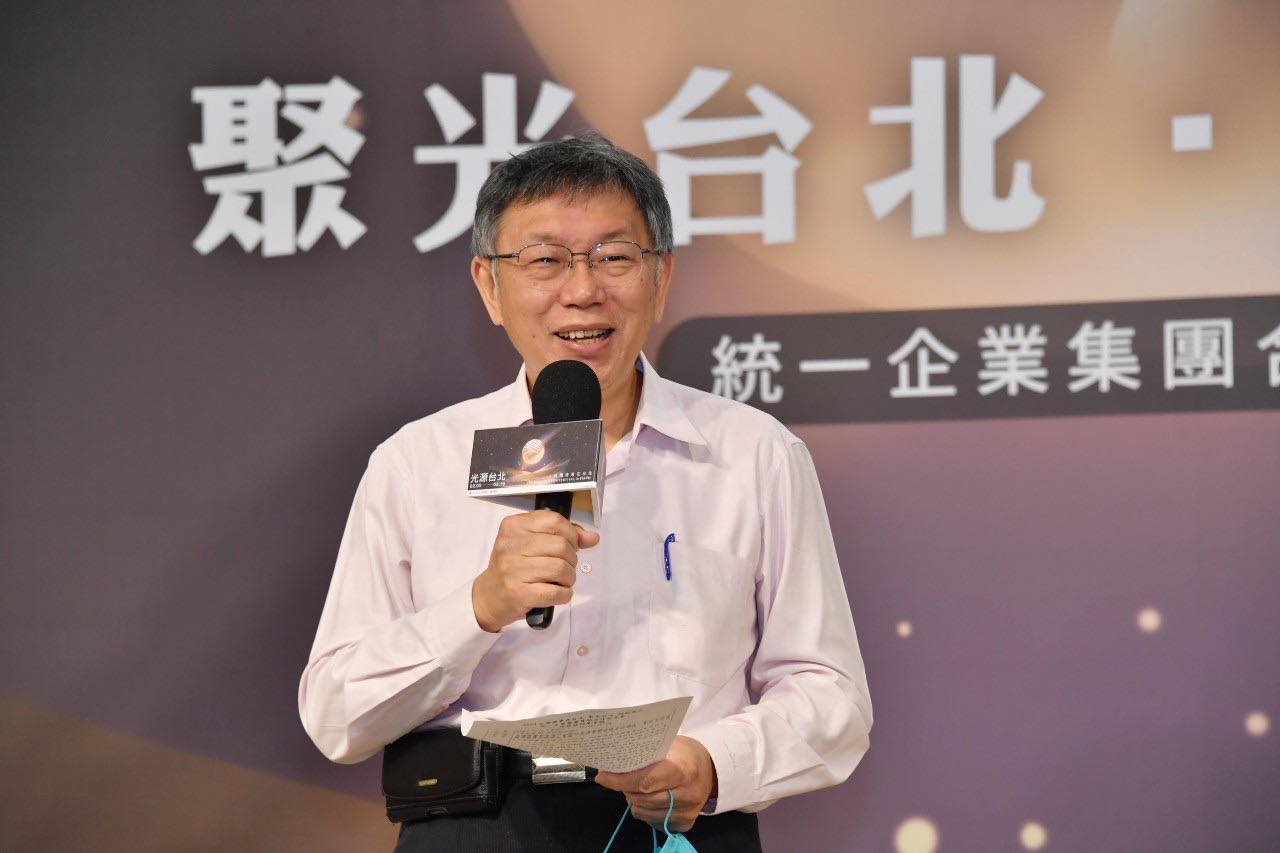by Brian Hioe
語言:
English
Photo Credit: Taiwan People/s Party/Facebook
THE FUTURE OF the TPP remains unclear in November elections. Namely, the elections will prove an important testing ground for the party as to its strength, with the TPP having won five seats in the legislature to overtake the NPP in the 2020 elections.
The TPP will be seeking to expand its power at the local level, through fielding city council and mayoral candidates. The TPP is currently seen as a light blue party, with its leader Taipei mayor Ko Wen-je having pivoted towards the pan-Blue camp after originally winning office in 2014 with the endorsement of the DPP, at which point he was seen as a pan-Green candidate.
 TPP Taipei mayoral candidate Huang Shan-shan. Photo credit: Huang Shan-shan/Facebook
TPP Taipei mayoral candidate Huang Shan-shan. Photo credit: Huang Shan-shan/Facebook
Polling suggests that some TPP candidates are doing quite well, with Taipei mayoral candidate Huang Shan-shan neck and neck with Chiang Wan-an of the KMT and Chen Shih-chung of the DPP, though Huang is notably a member of the People First Party and not the TPP–even if she is backed by the party. Yet the TPP still has fewer resources compared to the KMT and less deeply rooted mobilization networks–a challenge facing any third party of the pan-Blue or pan-Green camps, seeing as they are in competition with the dominant party of that camp, and need to find ways to win elections with fewer resources while also distinguishing themselves as a party from that dominant party.
One has seen a wave of plagiarism accusations against both pan-Blue and pan-Green candidates in this election cycle. The wave of plagiarism accusations broke out after the DPP’s candidate for Taoyuan mayor, former Hsinchu mayor Lin Chih-chien, was found to have plagiarized his thesis from National Taiwan University. Lin later withdrew from the Taoyuan mayoral race.
Since then, both pan-Blue and pan-Green candidates have faced plagiarism charges. But
the TPP has likely been disproportionately affected by plagiarism charges compared to other parties, due to its small size compared to the KMT or DPP, diffusing the weight of such charges. TPP legislator Tsai Pi-ru, a close associate of Ko dating back to his medical career, has resigned due to plagiarism charges, to be replaced by Shin Kong Life Insurance vice president Cynthia Wu. Likewise, the TPP’s Hsinchu mayoral candidate, legislator Ann Kao, is now being sued by the state-run Institute for Information Industry (III), over using sections of a report she wrote for the III for her Ph. D dissertation. The TPP is likely to defend itself by claiming that this is an attack on it from the Tsai administration, however. More recently, Kao has become embroiled in reports about a purported affair.
In the meantime, it is possible that the TPP is still trying to avoid coming off as too pan-Blue of a party. Even as Ko has come under fire lately for refusing to agree to sign a vow committing to defend Taiwan against Chinese invasion, the TPP recently went on the attack against domestically manufactured and developed COVID-19 vaccine Medigen by alleging links between the company that conducted phase 2 testing with a Chinese company. This line of attack was also taken up by the KMT, most notably in the Taipei mayoral elections.
Nevertheless, as the TPP enters November elections, it proves significant that this means that party leader Ko Wen-je will also be leaving his position as Taipei mayor and no longer serve in any elected position. Ko’s presidential ambitions are well-known, though Ko had previously suggested that he might run as Taoyuan mayor before dropping the idea.
 Taipei mayor Ko Wen-je. Photo credit: Ko Wen-je/Facebook
Taipei mayor Ko Wen-je. Photo credit: Ko Wen-je/Facebook
Either way, the TPP’s major politicians are individuals who did not join the party out of loyalty to Ko and, in fact, often had political careers that predated Ko’s. It is possible that Ko will face challenges from within his own party going forward or even be challenged for leadership of the TPP. Ko has himself seemed to perceive threats from within the party, sometimes engaging in spats with his subordinates or expectedly criticizing them.
Such splits are particularly likely to be accentuated regarding the TPP’s political positioning as a light blue party, with Ko sometimes seeming to want to take the TPP in a more deep blue direction through comments such as advocating that a bridge be built between Kinmen and China. This could potentially lead to splits between Ko and the party membership or between Ko and TPP politicians, or lead to difficulties in consistent messaging on the part of the party.
A potential point of rupture, particularly going into 2024 presidential elections, may be the question of how to relate the KMT–in effect, the same issue that led to splits in the NPP before it, with then-party chair Huang Kuo-chang wanting to direct the DPP while other members urged a united front with the DPP against the KMT. Ko may diverge from party members that hope for a more cooperative relationship with the KMT or vice-versa. Proposals from KMT politicians to cooperate may also receive mixed reception not only within the TPP, but the KMT as well, perhaps prompting splits in both parties. One has already seen this with early proposals by Jaw Shaw-kang that the parties align to divide the spoils of the upcoming elections.

